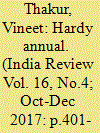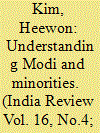| Srl | Item |
| 1 |
ID:
156810


|
|
|
|
|
| Summary/Abstract |
This article traces the history of India’s first resolution at the United Nations (UN). Introduced in 1946, “Treatment of Indians in the Union of South Africa” became an annual item on the UN agenda until 1962 when it was merged with another India-sponsored item on “apartheid.” For seventeen years, in a fast polarizing world, Indian diplomats used this item to strategically galvanize global opinion against racism. Against all odds, Indian representatives utilized every diplomatic means available to keep the “hardy annual” alive. A thick, archival biography of this item also allows us to interrogate India’s diplomatic practice in the Nehru years.
|
|
|
|
|
|
|
|
|
|
|
|
|
|
|
|
| 2 |
ID:
156809


|
|
|
|
|
| Summary/Abstract |
This article explores how the Bharatiya Janata Party (BJP) has pursued its ideology of Hindu nationalism through educational reforms. It pays most attention to the reforms undertaken by the first BJP-led National Democratic Alliance (NDA) government, from 1998–2004. A key argument is that these reforms mirrored BJP’s ideology. The reforms were legitimized with reference to certain challenges facing contemporary Indian society, particularly the threats represented by value degradation and a weakening of indigenous traditions. I view such arguments in terms of sublimating all challenges to the cultural realm. Moreover, these reforms aimed to establish an education system based on a coherent, integrative framework, concurring with the ideological outlook of the BJP. In the final part of the article, I examine the current NDA regime and seek to explain why similar reforms do not appear to be high on Prime Minister Modi’s agenda. By doing so, the article sheds light on the question of Modi’s commitment to Hindu nationalist ideology. A major argument is that to Modi, Hindutva-inspired reforms of the education system collide with the promises made during his electoral campaign and with key elements of the political programs he has initiated so far.
|
|
|
|
|
|
|
|
|
|
|
|
|
|
|
|
| 3 |
ID:
156808


|
|
|
|
|
| Summary/Abstract |
In the May 2014 general elections in India, the Bharatiya Janata Party (BJP) emerged as the majority party. The BJP has formed a coalition with regional parties (the National Democratic Alliance), but many view the event as a “critical election,” presaging the realignment of Indian politics along Hindu nationalist values. This article reviews the approaches used to understand the BJP-led NDA government’s policies toward religious minorities and argues that far from marking a radical departure, there are more continuities than discontinuities in these policies with previous administrations.
|
|
|
|
|
|
|
|
|
|
|
|
|
|
|
|